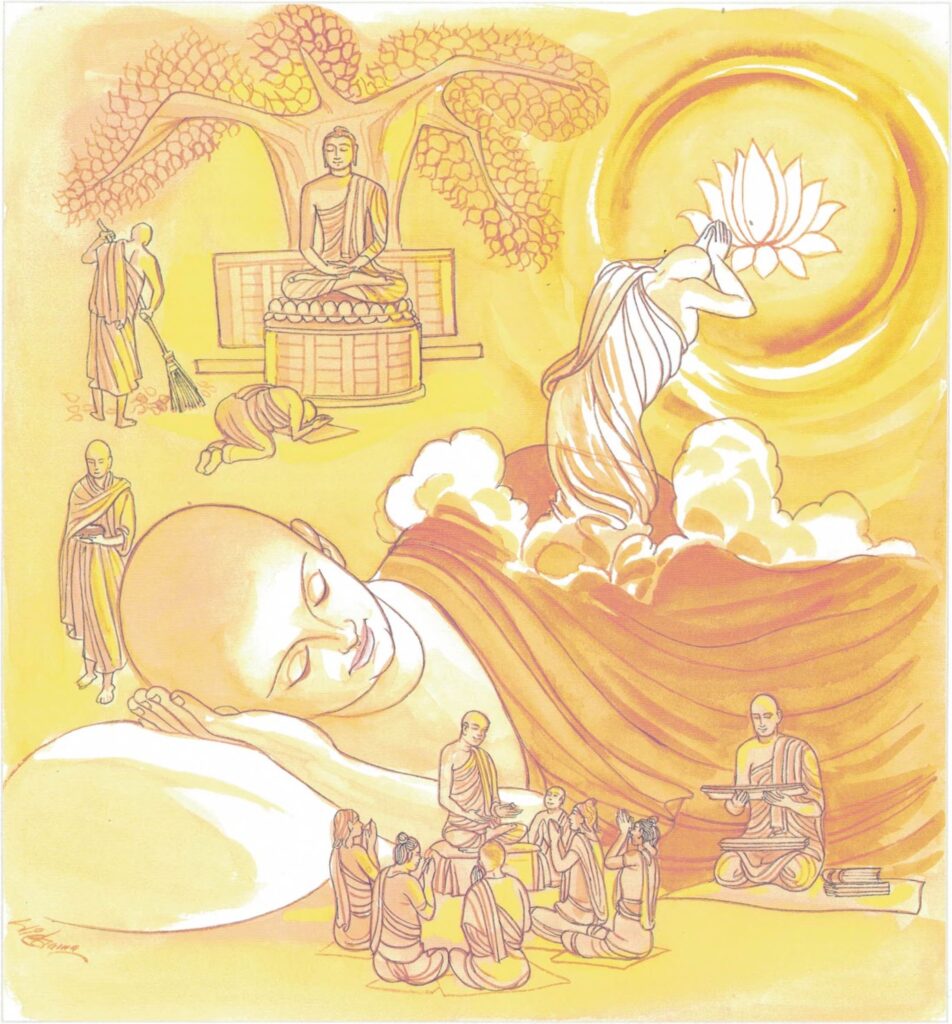Pali text, illustration and English translation of Dhammapada verse 381:
pāmojjabahulo bhikkhu pasanno buddhasāsane |
adhigacche padaṃ santaṃ saṅkhārū’pasamaṃ sukhaṃ || 381 ||
381. The bhikkhu full of joy and faith, bright in the Buddha’s Teaching can come to the Place of Peace, the bliss of conditionedness ceased.

The Story of Monk Vakkali
This religious instruction was given by the Buddha while he was in residence at Veluvana with reference to Venerable Vakkali.
Venerable Vakkali, we are told, was reborn at Sāvatthi in the household of a brahman. One day, after he had reached manhood, he saw the Buddha enter the city for alms. Having surveyed the Buddha’s beauty of person, not satisfied with the sight of the beauty of his person, be said to himself, “I will obtain the privilege of looking thus at all times upon the Buddha.” He therefore retired from the world and became a monk under the Buddha. He always stood where he could see the possessor of the ten forces, and abandoning the recitation of the sacred word and the practice of meditation, he spent his whole time gazing upon the Buddha. The Buddha waited for his knowledge to ripen and said not a word. One day the Buddha perceived within himself, “Now his knowledge has ripened;” so he said to him, “Vakkali, what shall it profit you to look upon this mass of corruption which is called my body? Whosoever, Vakkali, beholds the Dhamma, he beholds me.” Thus did the Buddha admonish Venerable Vakkali.
But in spite of the Buddha’s admonition, Vakkali could not let the Buddha get out of his sight or leave his presence. Finally the Buddha thought, “Unless this monk receives a shock, he will never come to understand.” Now the season of the rains was at hand, and the Buddha desired to enter upon residence. So on the day appointed to enter upon residence, the Buddha went to Rājagaha, turning Vakkali away with the words, “Go back, Vakkali.” So for the space of three months Vakkali was unable to be with the Buddha and kept saying to himself, “The Buddha speaks to me no more.” Finally he said to himself, “What is the use of my living any longer? I will throw myself headlong from the top of a mountain.” And with this thought in mind, he climbed to the top of Mount Vulture Peak.
The Buddha, perceiving that he was depressed and weary of the world, thought to himself, “If this monk receives no comfort nor consolation from me, he will destroy his predispositions to the attainment of the paths and the fruits.” Accordingly he sent forth a radiant image of himself and displayed himself before the gaze of the monk. The moment the monk saw the Buddha, the weight of sorrow which oppressed him vanished, Then the Buddha, as though filling the dry bed of a lake with a torrent of water, caused intense joy and satisfaction to spring up within the monk.
Venerable Vakkali thought, “I have seen the Possessor of the Ten Forces, and he speaks to me, saying, ‘Come!’” Straightway he experienced profound joy. “How pray shall I go?” thought he. And standing there on the summit of the mountain, though he saw no path, he sprang into the air face to face with the Possessor of the Ten Forces, on hearing the first words of the stanza. And as he soared through the air, pondering the stanzas given by the Buddha, he completely suppressed the emotion of joy and attained arahantship together with the supernatural powers. And praising the Buddha, he descended and stood in the presence of the Buddha. On a subsequent occasion the Buddha assigned him the foremost place among those who possess the propensity for faith.
Explanatory Translation (Verse 381)
pāmojjabahulo buddhasāsane pasanno bhikkhu
saṅkhārūpasamaṃ sukhaṃ santaṃ padaṃ adhigacche
pāmojjabahulo [pāmojjabahula]: of abundant ecstasy; buddhasāsane: in the Teaching of the Buddha; pasanno [pasanna]: taking delight in; bhikkhu: the monk; saṅkhārūpasamaṃ [saṅkhārūpasama]: cessation of all conditioning; sukhaṃ [sukha]: blissful; santaṃ padaṃ [pada]: state of tranquility (Nibbāna); adhigacche: will reach
His ecstasy is abundant. He takes delight in the Teaching of the Buddha. Such a monk will reach the state of total tranquility–Nibbāna–through the blissful ending of all conditioning.
Commentary and exegetical material (Verse 381)
saṅkhārūpasamaṃ: cessation of all conditioning. saṅkhāra is one of the five aggregates (five groups of existence or groups of clingings). Sankhāra is described as mental formation. These aggregates are also described as khandas. These saṅkhāras are made up of fifty mental phenomena of which eleven are general psychological elements, twenty-five lofty (sobhana) qualities and fourteen kammically unwholesome qualities. Saṅkhāra is the second link of the formula of dependent origination (paticca samuppāda). Saṅkhāra is also used in the sense of anything formed, conditioned or composed.